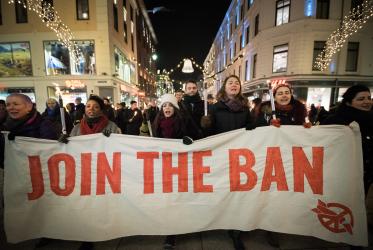In an official ceremony on 10 December that reflected a lifetime of work for many peacemakers, International Campaign to Abolish Nuclear Weapons (ICAN) executive director Beatrice Fihn joined the world in celebration but also sent a clear message: there is still a lot of work to do.
“Today is a day of celebration, of course,” she said, “but we also have to look forward to the work that’s ahead of us.”
The Norwegian Nobel Committee honoured the Geneva-based group "for its work to draw attention to the catastrophic humanitarian consequences of any use of nuclear weapons and for its ground-breaking efforts to achieve a treaty-based prohibition of such weapons.”
On 9 December, a prayer service at the Trinity Church in Oslo drew church leaders from Norway and ICAN representatives, with a sermon by World Council of Churches general secretary Rev. Dr Olav Fykse Tveit.
In a message released in conjunction with the awards ceremony, Fihn said ICAN has two priorities in the coming years. The first is getting all states to sign and ratify the Treaty on the Prohibition of Nuclear Weapons, which opened for signature on 20 September. The second is ensuring the treaty has an impact on the states that won’t immediately sign the treaty, which needs 50 signatures to enter into force.
The treaty was adopted 7 July with the backing of 122 nations at the United Nations General Assembly in New York.
It’s time to celebrate - and time to mobilize, added Fihn. “We’re going to focus and mobilize our efforts right now as a campaign and we’re going to need all the help we can get,” she said. “We have a window of opportunity. We have the treaty, we have this Nobel Peace Prize but we also have an increasingly threatening situation in the world.”
ICAN, founded a decade ago, is a coalition of 400 non-governmental organizations in 100 countries. The World Council of Churches is one of its partners along with many civil society organizations. At its headquarters in Geneva, ICAN has a staff of four people.
ICAN and its partners need to use the next thousand days to really make an impact on the process to eliminate and prohibit nuclear weapons, Fihn concluded. “I am looking forward to doing this with you.”
WCC work on nuclear arms control
Banning nuclear weapons, 122 governments take leadership where nuclear powers have failed (WCC press release, 8 July 2017)
Download the ICAN statement on receiving the Nobel Peace Prize








